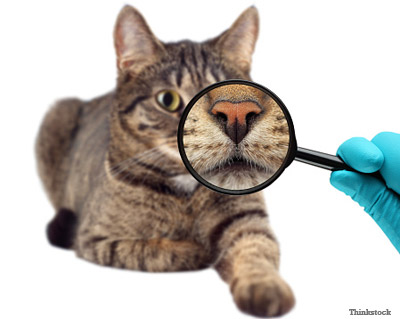
If you share your life with a cat, or two, or five, you have almost certainly heard your cat making a very troubled wheezing, coughing, retching sound that you assumed to be a hairball. Sometimes though, no hairball is produced; then you ask “Could it be something else?” Well yes it could.
Let’s take a look a 5 things that you may think are hairballs.
1. Asthma
Some cats that we may think have hairballs may actually have serious respiratory problems. Frequent or prolonged episodes of coughing may in fact be the result of serious respiratory conditions such as feline asthma.
If you listen closely, you may be able to detect a wheezing sound as the cat exhales.
Feline asthma can be treated using systemic corticosteroids or administration of an inhalant medication as is used in people.
[Learn more about asthma in cats.]
2. Feline heartworm disease
HARD describes a lung disease caused by heartworms in cats. Yes, you read that correctly— lung disease. Adult worms, if present, tend to reside in the blood vessels of the infected cat’s lungs. Additionally, developing immature worms can set off a severe, inflammatory response in the smaller lung blood vessels, in the airways and in the lung tissue itself1.
[Learn more about HARD here.]
3. Foreign bodies
On occasion, a foreign body such as a grass awn or blade of grass will be inhaled and cause a stubborn cough. Many cats like to eat grass and sometimes the blade of grass can become lodged in the throat. This can cause a gagging, hacking cough. Most such foreign bodies will be difficult to see on radiographs. Persistent coughs might have to be evaluated by directly examining the airways using a bronchoscope. This instrument will also allow for removal of the foreign body.
This is another reason why keeping cats inside is a good idea.
4. Chemical irritants
Sprays, powders and propellants can cause a harsh cough that is similar to that of a hairball. Flea spray and flea powders can be inhaled and will cause sudden coughing episodes. Always cover your cat’s face when using such products.
[Check out 'Flea and Tick Insecticide Poisoning in Cats.']
5. Hairballs
Of course sometimes the cause of coughing and retching is actually a hairball.
Hairballs, known to veterinarians as trichobezoars, occur as a result of cats grooming and swallowing the hair they remove. Many cats spend a good deal of their day grooming. Usually, the hair passes through the intestinal tract, but some cats are more prone than others to accumulating hair in the stomach. Generally, hairballs are harmless but not always.
What do cats do when they have a hairball? Generally your cat will crouch with her neck extended, hacking and gagging in distress until she vomits up the offending wad of hair.
Treatment of hairballs involves regular grooming and the use of lubricants to help hairballs pass.
[Learn more about hairballs here.]
How can you know if it’s a hairball or not?
If your cat coughs, and particularly if a hairball is not produced, it is important to have your veterinarian evaluate the cough to determine its cause, and do whatever is possible to control the cough. See your veterinarian regularly and remember that whether your cat has a cough or not, it is recommended that you use year-round heartworm prevention.
If you have any questions or concerns, you should always visit or call your veterinarian -- they are your best resource to ensure the health and well-being of your pets.
Resources:
